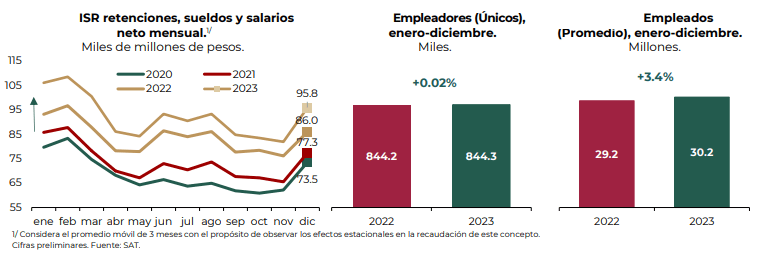What has been the impact of the reforms related to labor outsourcing in Mexico, according to the Mexican government?
First and foremost, the Decree modifying various provisions regarding labor subcontracting in Mexico entered into force on April 24, 2021.

With this, companies started with the employer substitution, which was reflected in a sustained increase of net income tax withholdings for wages and salaries.
The Mexican government reports that this increase was 5.0% in real terms in the period from January to December 2023, i.e., 109,545 million pesos more than in the same period of the previous year.
In the period from January to December 2023, the number of employers increased by 0.02% compared to the same period in 2022.
Likewise, at the end of the year, the number of employees also increased by 3.4%, from 29.2 to 30.2 million (986,000 more).
Labor outsourcing
The Federal Labor Law, which defines what is considered remote work and establishes obligations for both employers and workers, as well as the right to voluntarily return to face-to-face work, was amended three times in 2021.
For the first time, the Law was amended on January 11 to regulate telecommuting conditions, followed by an amendment on March 30 guaranteeing that the annual increase in the minimum wage will always be at least as high as the previous year’s inflation.
Finally, the Law was amended on April 23 to limit the use of subcontracting.
As a result of this last amendment, only certain specialized services and the execution of certain specialized works may be subcontracted and must be provided by individuals and legal entities that meet certain requirements and are registered with the Secretaría del Trabajo y Previsión Social.
Vacations
On the other hand, the Convention on Violence and Harassment of the International Labor Organization, which aims to eradicate violence and harassment in the workplace, was approved by Mexico on April 6, 2022.
Articles 76 and 78 of the Federal Labor Law were amended on December 27, 2022 to increase from six to twelve the number of paid vacation days accrued during the first year of employment, and the amendments became effective on January 1, 2023.

